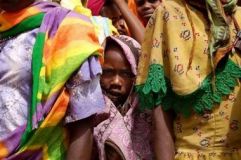Chadian refugees flee one war zone for another
Mar 19, 2006 (GEYLU, Sudan) — Elderly Hawa Osman clutched her niece as she recounted the horror of a militia attack on her village forcing her to flee for her life to a miserable squatter camp in Sudan’s Darfur region.
 A familiar story in Sudan’s remote west where three years of conflict has driven 2 million people from their homes. But there’s one difference — Osman is from Chad and says she was attacked by non-Arab Zaghawa militia armed by the Chadian government.
A familiar story in Sudan’s remote west where three years of conflict has driven 2 million people from their homes. But there’s one difference — Osman is from Chad and says she was attacked by non-Arab Zaghawa militia armed by the Chadian government.
Squatting in Darfur, just 2 kms (less than a mile) from the long and porous Sudan-Chad border, more than 20,000 Chadian refugees have been attacked and forced from their homes in the past four months since insurgents attempted to oust President Idriss Deby by attacking the border town of Adre.
“They came in cars, they stole all our cattle and drove us out into the desert,” said a wearily bemused Osman, waving her wrinkled, bony arms.
“I walked for eight days before arriving here.”
Each day more families trickle in from across the border in Chad. Many tribes traverse both sides of the Sudan/Chad border and the residents of Geylu in Darfur have welcomed their kinsmen. But food is running out fast as the number of refugees grows.
“We have nothing here, just what is in our hands,” said Zeinab Abdallah. “They came in camouflaged vehicles, stole everything we had and drove us out,” she said, holding her baby whose runny nose was attracting a cloud of flies.
The refugees said since December the Zaghawa-led Chadian government had been using militia to orchestrate attacks on villages along the border, searching for the insurgents.
“Ever since the Adre attack the government has been arming their people, the Zaghawa, and attacking us,” said Suleiman Ismail, a tribal leader among the Chadian refugees.
Ismail is Tama, the same tribe as Mahamat Nour, the leader of the Chadian guerrillas who attacked in December. Deby’s Zaghawa tribe and the Tama have long clashed but the recent attacks were politically motivated, Ismail said.
“When they attacked my village they were shouting ‘you are all rebels’ — but we don’t have any links to rebels,” he said. Ismail said six people were murdered in the attack on his village Gaffou, including his father.
Non-Arab Darfuri rebels took up arms in early 2003 against the Khartoum government, which the United Nations says retaliated by arming Arab militias, known locally as Janjaweed, who stand accused of a widespread campaign of rape, killing and looting. Washington calls the violence genocide.
Khartoum says it armed some tribes to quell the rebellion but denies any link to the Janjaweed.
Sudan has accused Chad of supporting the Darfur rebels. Now, it seems, it’s Deby’s turn.
Various Chadian insurgent groups have set up shop in Darfur and the threat of an imminent attack hangs over Deby, who narrowly escaped an assassination attempt last week in N’Djamena.
But those seeking refuge in makeshift straw shelters along the border are oblivious to the cross-border finger pointing.
“We need food, water — we have nothing now,” said refugee Ahmed Yagoub. “We are just farmers, but we cannot go back and harvest and our cattle have been stolen,” he said.
(Reuters)
